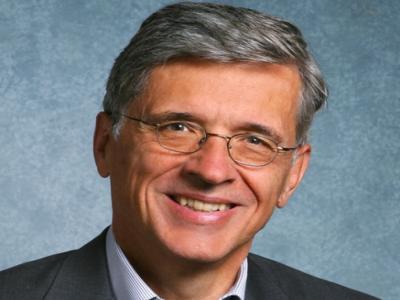CES: Wheeler Signals Title II Is Likely
The smarter way to stay on top of the multichannel video marketplace. Sign up below.
You are now subscribed
Your newsletter sign-up was successful

FCC chairman Tom Wheeler outlined his approach for establishing new rules for the “Open Internet” by suggesting he would use Title II, but in a relatively limited way, to ensure there would be “no blocking, no throttling and no paid prioritization.”
Wheeler made the comments at an annual Q&A with Consumer Electronics Association president and CEO Gary Shapiro during the 2015 CES convention on Jan. 7.
Wheeler also said that the FCC expects to send the proposed rules to FCC commissioners Feb. 5 and that the Commission will vote on them on Feb. 26. Commissioner Jessica Rosenworcel said Wednesday she was looking forward to seeing the chairman's proposal.
Shapiro pressed Wheeler in a congenial, often humorous fashion during the 50-minute Q&A for details on the plan, but the FCC chairman stuck to broader policy issues and the philosophy behind his approach saying, “You’ll have to wait until February for the details.”
Wheeler stressed that he was involved many years ago in creating the rules for the wireless industry that regulated them under 322 section of Title II but exempted them from other sections, such as the need to get approval for rate changes. He seemed suggested a similar approach would work for the Open Internet rules. “There is a way to do Title II right that says there are many parts of Title II that are inappropriate and [wrong] for investments.”
This approach, he argued, had allowed the wireless industry to grow into a hugely successful enterprise for both companies and consumers. Opponents of Title II point out that Title II wireless regime was applied to phone service, not broadband.
Whether or not to regulate Internet under Title II has been a matter of considerable debate, with ISP's generally opposing the idea, though Wheeler said that some smaller ISPs had told him they supported it. Last year, President Obama came out strongly in favor of Title II and suggested the FCC should do so, too.
The smarter way to stay on top of the multichannel video marketplace. Sign up below.
During the session, Wheeler vigorously denied reports that he and the President were at odds over the issue. “The president and I are both pulling towards the same [place]: no blocking.”
Overall, he stressed that the policy “was to ensure that innovators and consumers have open access to networks” so that there is “sufficient incentive for ISPs to build better networks.”
He did joke, however, about criticism of his net neutrality policy from comedian John Oliver and noted that he’d received a Christmas gift from his daughter related to the issue. She gave him a framed collection of pictures of him playing with his grandchildren. The caption on the frame read: “Would you let your kids play with a dingo?”
When asked about Dish’s plans to offer a package of cable channels over the internet, Wheeler replied that “it is symbolic of everything that is going on. Video used to be defined by the network that delivered it. The new technologies have changed video so it can be distributed over [any] network and device. But the rights to that product still [pose] impediments, which is why we are beginning rule making so that over-the-top can be defined as an MVPD so they can have access to programming the way satellite providers have.”
Wheeler also added that “this is why the whole open internet is so damn important because you have to have access to pathways.”
In terms of the broadcast spectrum auctions, Wheeler said that they were still on course “to have an auction in early 2016.” And as argument for why Title II reclassification would not be the investment and innovation chiller some ISP’s have told him it would be, he cited the AWS-3 auction and the record bidding for that spectrum even after the President weighed in calling for Title II.
“It is disappointing that broadcasters have brought suit to slow things down, but hopefully that will be argued in March and decided in May or June…so that we are in a position to go forward with the final rules.” He has targeted the incentive auction for early 2016.
This piece includes additional reporting by John Eggerton.
